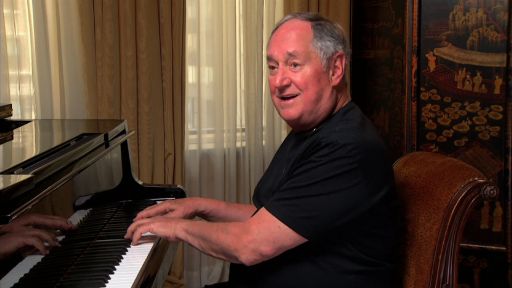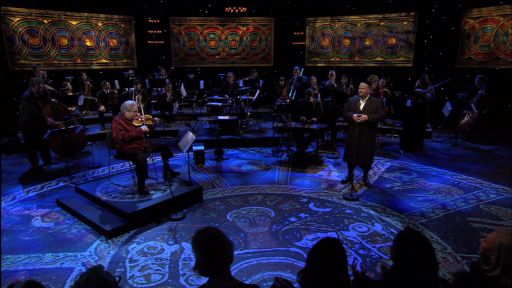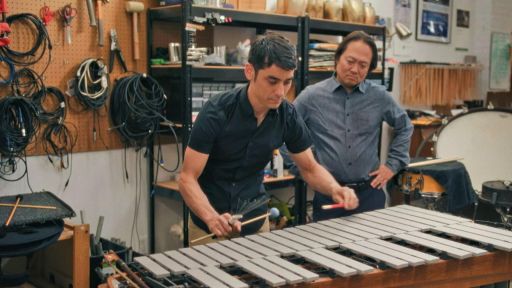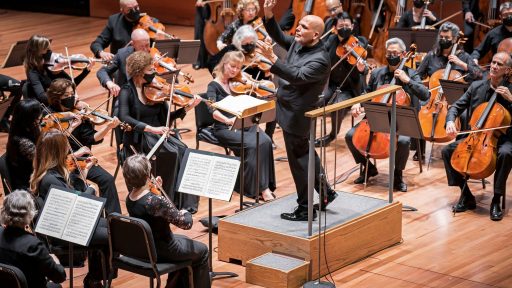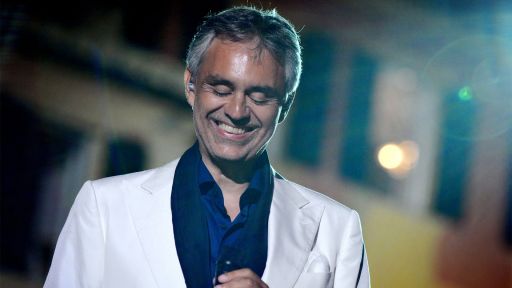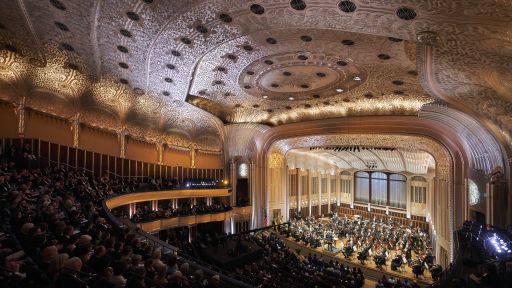Legendary violinist Itzhak Perlman and renowned cantor Yitzchak Meir Helfgot join forces for a musical exploration of liturgical and traditional works in new arrangements for both chamber orchestra and klezmer settings on THIRTEEN’s Great Performances, airing Thursday, August 28 at 9 p.m. on PBS. (Check local listings.)
The music of Rejoice with Itzhak Perlman and Cantor Yitzchak Meir Helfgot – with reminiscences by Elie Wiesel, Joel Grey, and Tovah Feldshuh — showcases the confluences between the violinist’s famed classical technique and Helfgot’s magnificent voice, and is the result of a mutual admiration society. “It was a dream to someday sing with him,” remarks Helfgot. “And now the dream has become real.”
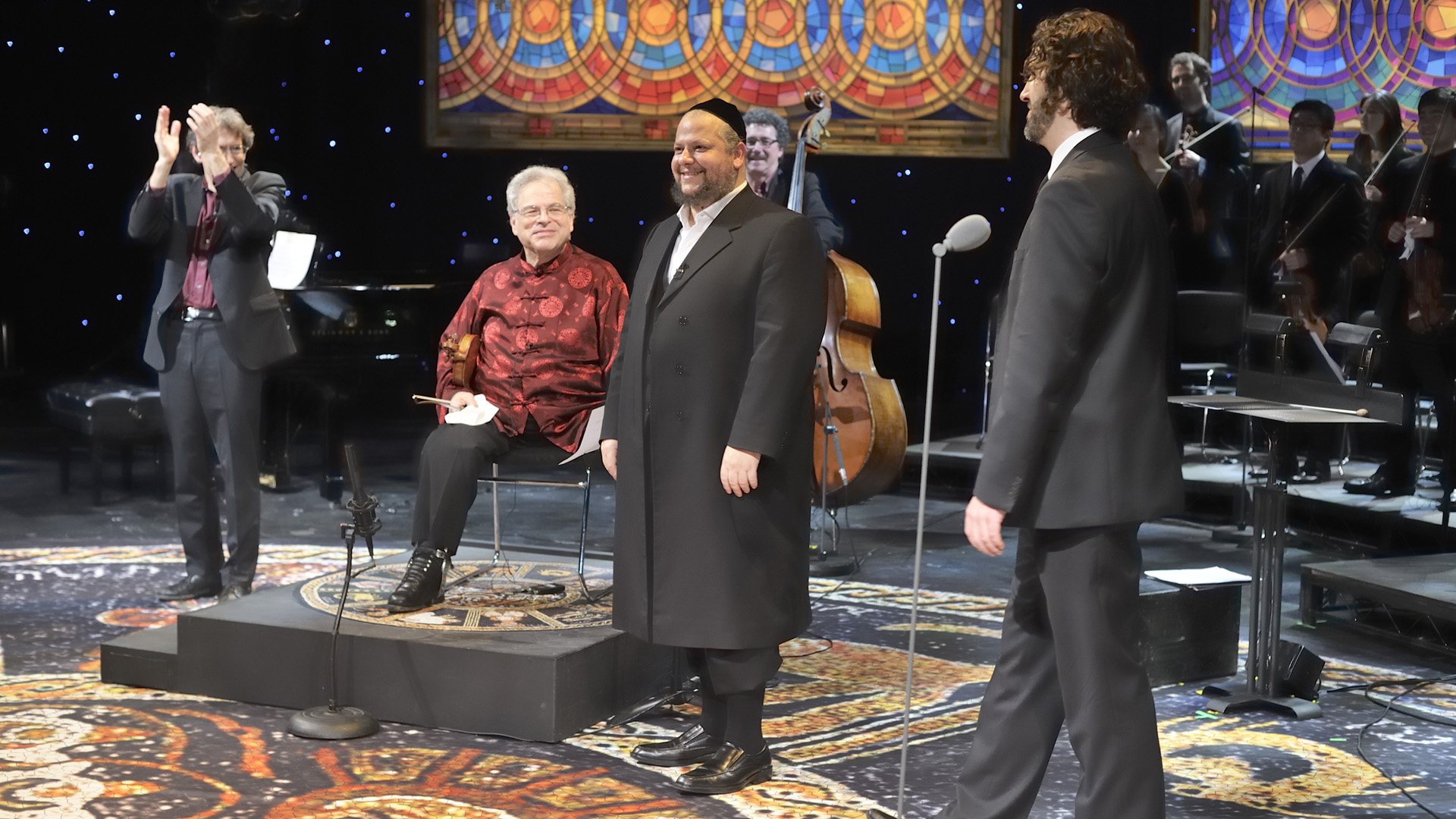
Great Performances: Rejoice! Itzhak Perlman and celebrated cantor Yitzchak Meir Helfgot join forces for a musical exploration of liturgical and traditional works.
For Perlman, the collaboration represents “the completion of a cycle” of accompanying three great voices, Placido Domingo, Luciano Pavarotti, and now Helfgot who serves as Chief Cantor at Manhattan’s Park East Synagogue. This represents for him, too, “the fulfillment of a dream.” The pair recently collaborated in a couple of show-stopping pieces on the Great Performances 40thAnniversary Celebration.
In Rejoice with Itzhak Perlman and Cantor Yitzchak Meir Helfgot, these two incomparable virtuosos unite for an evening of cantorial masterpieces, Yiddish folk and theater tunes, Hassidic melodies, and klezmer instrumentals.
With Dr. Hankus Netsky, who teaches at the New England Conservatory in Boston, at the piano, the Klezmer Conservatory Band which he founded, and the Rejoice Chamber Orchestra under the direction of Russell Ger, Perlman and Helfgot run through a program of songs that are alternately joyful and intensely moving, but the latter mood nearly always segueing into a buoyant climax.
Perlman provides elucidating and humorous commentary between numbers interacting with the Netsky, Helfgot, and the audience.
It’s a varied program from Jack Yellen and Lou Pollack’s “My Yiddishe Mamma,” immortalized by entertainer Sophie Tucker to Shlomo Carlbech (“The Singing Rabbi”)’s “Adir Hu” to “Sheyibone Beys Hamikdosh,” the most popular melody written for a Jewish liturgical text.
Music History
Khazones (cantorial music) comprise the original repertoire of the traditional Eastern-European Jewish prayer leader. Born of a culture whose primary theater was the religious sanctuary, the cantorial art focuses on texts that express both a deep longing for a return to a homeland and a powerful glorification of all that is divine.
“It’s roots music – big-time roots music,” Netsky explains. “It’s Romanian, Ukrainian, Russian and gypsy-influenced folk music with a very strong Jewish accent – as if it’s a Jewish prayer. I liken it to the blues…It has just the right amount of happy and sad – laughter through tears.”
By the 1700s, khazones had spawned a florid vocal style that caught the attention of the most sophisticated composers and performers of that time. Cantorial music continued to develop through the middle of the 20th century, when extraordinary tenors including Jan Peerce and Richard Tucker made the transition from the synagogues of Brooklyn to the Metropolitan Opera.
Earlier in the same century, Yossele Rosenblatt, the most popular cantor ever, had ventured out on an even more adventurous path, the Keith Vaudeville circuit, where he shared the stage with such icons of Americana as xylophonist George Hamilton Greene and songstress Sophie Tucker – and even made a memorable appearance in Al Jolson’s groundbreaking movie, “The Jazz Singer,” shared his cantorial repertoire with the world.
In the early twentieth century, the great opera singers of Europe flocked to the synagogues of Warsaw, Odessa, Vilna and Kiev to hear superstar cantors weave intricate improvisations and hit jewel-like high notes. Congregants took delight at the exquisite liturgical tone painting that was the trademark of cantorial music’s most skilled and creative practitioners.
But after the Holocaust, the majority of American rabbis and Jewish educators placed their priority on crafting a new Jewish culture that was less closely identified with the Eastern European world that had been destroyed, and was more compatible with the youthful spirit of the new Jewish homeland. But, lately, the tide has shifted once again as today’s young Jewish music enthusiasts seek out roots music that resonates with deeper messages of identity and passion, artistry and longing.
In the folksong, “A Dudele” (A Song to You) the legendary Hassidic Rabbi, Levi Yizchok of Berditchev (Ukraine), ponders the intimate nature of his relationship with the Master of the Universe. “Everything I do, everywhere I go, you are with me.” The rendition culminates in the lively “Berditchever Sher,” a dance tune that figures prominently in the folk song. “Romanian Doyne,” an actual traditional shepherd’s lament, follows and reminds us just how closely the music of the cantor and klezmer (traditional Jewish folk instrumentalist) are linked.
“Yism’chu” (Rejoice) embodies the theme of exultation, as it appears in the liturgy of the Sabbath, the day of rest. A traditional Hassidic-style setting based on a klezmer rendition by the great clarinetist Shloimke Beckerman, leads into a spirited dance tune.
Cantor Israel Schorr’s “Sheyibone Bays Hamikdash” (May the Temple Be Rebuilt), based on a meditation that observant Jews express in the Amidah prayer three times each day, shows how a fairly simple folk melody can spawn an elaborate composition.
Music Program
Yism’chu (They Shall Rejoice)
Romanian Doyne
Shoyfer Shel Moshiakh (Ram’s Horn of the Messiah)
A Dudele (A Song to You)
Sheyibone Bays Hamikdosh (May the Holy Temple Be Rebuilt)
A Yiddishe Momme (A Yiddish Mother)
Adir Hu/Moyshe Emes (Mighty Is He/Moses is True)
Yism’chu (closer)
Production Credits


